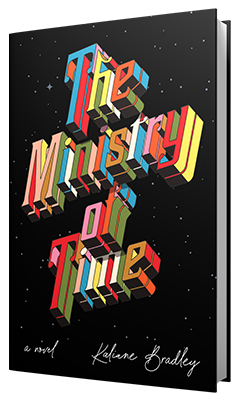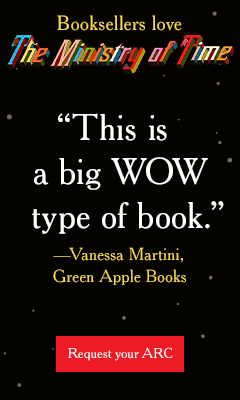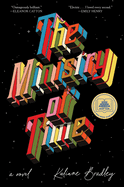The Ministry of Time
by Kaliane Bradley
A disillusioned civil servant signs on to a secret time travel project in Kaliane Bradley's inventive debut, The Ministry of Time. In near-future England, the government has discovered technology to bring people forward through time and has collected five Brits from previous centuries. The unnamed protagonist is hired as a "bridge," someone who will live and work with one of these "expats" from history. She is assigned to Commander Graham Gore of the Royal Navy, a sailor and polar explorer transported just before his death during the doomed 1845 Franklin expedition to discover the Northwest Passage through the Arctic.
Bradley deftly blends science fiction, romance and thriller, creating an immersive world and plot that cry out for film adaptation. Readers are so swept up by the workplace and culture-clash humor that the moral quandaries and behind-the-scenes scheming form a background hum only noticeable when the protagonist is forced to acknowledge them. As the bridges spend time with their charges, and the expats learn to live in their new world, the narrator and Gore's initial attraction bumps and jostles its way toward a romance. Stuffy Victorian Gore is simply not equipped to court a modern woman, and the narrator is determined not to be courted. The pair spend nearly every hour together, however, creating a situation replete with sexual tension even as they engage in the most mundane of activities: "He was an anachronism, a puzzle, a piss-take, a problem, but he was, above all things, a charming man. In every century, they make themselves at home."
Bradley's expertly drawn characters are both entertaining and intriguing. Referred to as Nineteen-sixteen, Arthur Reginald-Smyth is a young gay or bisexual man taken from the front lines of the Battle of the Somme in World War I. Margaret ("Maggie") Kemble--Sixteen-sixty-five--is a lesbian who was locked in a room alone to die of bubonic plague during the Great Plague of London. Odious Lieutenant Thomas Cardingham--Sixteen-forty-five--was taken from the Battle of Naseby during the First English Civil War. Anne Spencer was saved from beheading during the 1793 French Revolution. And 38-year-old Graham Gore, also known as Eighteen-forty-seven, is a fictionalized version of the real Commander Gore, who died with the rest of the men during the Franklin expedition. Arthur's sweetness and pining for Graham endear him to readers, while Maggie's exuberance and foul mouth are equally compelling. They quite often steal scenes from Graham--a feat, considering the man's appeal.
Between chapters, Bradley shares Gore's story: a haunting narrative of seafaring adventure and camaraderie turned frozen nightmare. These interstitials remind readers that the main story isn't the entire picture, that each individual inhabits their own reality inside the collective experience. "Nineteen-sixteen was as incomprehensible to Sixteen-forty-five as I was," the narrator says. "Everyone was paddling in their own era-locked pool of loneliness." Bradley's complicated narrator is sometimes difficult to root for, though she never quite fits the label of anti-heroine. She grapples with depression and PTSD, but considers both to be a personal failing. Her upbringing as the daughter of a survivor of the Khmer Rouge shapes her outlook, whether she acknowledges it or not. Her refusal to process her own trauma meaningfully at times inhibits her ability to empathize with the expats; her journey from disaffected government cog to slightly more empathetic friend and partner is slow but satisfying.
Nothing about secret government-managed time travel is simple, however, and soon the protagonists encounter problems of both the ethical and gun-wielding varieties. Some months into the project, the narrator is abruptly cut off from her supervisor. The unanswered questions and suspicious happenings continue to mount and soon she, Gore, and the other expats are caught in a battle not just for their lives, but also the future. England is wracked by powerful storms and heat waves, shocking to Gore, unsettlingly normal to the narrator, and a portent of things to come for readers. The inevitable question of changing the past comes up several times, and Bradley skirts the answer by presenting the opinions of several cagey characters and of the Ministry itself. Which is correct? Could they be using their new power to prevent catastrophic climate change or any of the other humanitarian and ecological disasters of the Anthropocene? Who would benefit?
Bradley also addresses the idea of assimilation and diaspora at large. What does it mean to be a refugee or an immigrant? This question is echoed in the Ministry's attempts to resolve issues with some of the expats not showing up on scanners or in other measurements: the problem of "hereness" and "thereness," or how aligned an expat is with their current time and their home time. "At the crux of all the time-travel hypotheses was the question: how do you measure a person?"
The chaotic climax of the novel gives way in the end to something wistful, a temporary happiness found despite a looming, dire future. "Forgiveness and hope are miracles. They let you change your life. They are time-travel." The Ministry of Time encapsulates life's paradoxes as easily as it transcends genre. Readers may see echoes of Severance's disaffected second-generation office worker-turned-heroine, or the romantic time travel adventure of Outlander, but Kaliane Bradley has created something equally brilliant and entirely her own. --Suzanne Krohn








